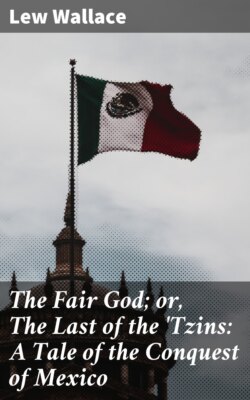Читать книгу The Fair God; or, The Last of the 'Tzins: A Tale of the Conquest of Mexico - Lew Wallace - Страница 27
На сайте Литреса книга снята с продажи.
CHAPTER VII
COURT GOSSIP
ОглавлениеTable of Contents
“A pinch of your snuff, Xoli! To be out thus early dulls a nice brain, which nothing clarifies like snuff. By the way, it is very strange that when one wants a good article of any kind, he can only get it at the palace or of you. So, a pinch, my fat fellow!”
“I can commend my snuff,” said the Chalcan, bowing very low, “only a little less than the good taste of the most noble Maxtla.”
While speaking—the scene being in his pulque room—he uncovered a gilded jar sitting upon the counter.
“Help yourself; it is good to sneeze.”
Maxtla snuffed the scented drug freely, then rushed to the door, and through eyes misty with tears of pleasure looked at the sun rising over the mountains. A fit of sneezing seized him, at the end of which, a slave stood by his elbow with a ewer of water and a napkin. He bathed his face. Altogether, it was apparent that sneezing had been reduced to an Aztec science.
“Elegant! By the Sun, I feel inspired!”
“No doubt,” responded the Chalcan. “Such ought to be the effect of tobacco and rose-leaves, moistened with dew. But tell me; that tilmatli you are wearing is quite royal—is it from the king?”
The young chief raised the folds of the mantle of plumaje, which he was sporting for the first time. “From the king? No; my tailor has just finished it.”
“Certainly, my lord. How dull I was! You are preparing for the banquet at the palace to-morrow night.”
“You recollect the two thousand quills of gold I bid for your priestess the other evening,” said Maxtla, paying no attention to the remark. “I concluded to change the investment; they are all in that collar and loop.”
Xoli examined the loop.
“A chalchuite! What jeweller in the city could sell you one so rich?”
“Not one. I bought it of Cacama. It is a crown jewel of Tezcuco.”
“You were lucky, my lord. But, if you will allow me, what became of the priestess? Saw you ever such dancing?”
“You are late inquiring, Chalcan. The beggar was fast by starvation that night; but you were nearer death. The story was told the king—ah! you turn pale. Well you may—and he swore, by the fires of the temple, if the girl had been sold he would have flayed alive both buyer and seller. Hereafter we had both better look more closely to the law.”
“But she moved my pity as it was never moved before; moreover, she told me they had discharged her from the temple.”
“No matter; the peril is over, and our hearts are our own. Yesterday I saw her in the train of the princess Tula. The ’tzin cared for her. But speaking of the princess—the banquet to-morrow night will be spicy.”
The Chalcan dropped the precious loop. Gossip that concerned the court was one of his special weaknesses.
“You know,” continued Maxtla, “that the ’tzin has always been a favorite of the king’s—”
“As he always deserved to be.”
“Not so fast, Chalcan! Keep your praise. You ought to know that nothing is so fickle as fortune; that what was most popular yesterday may be most unpopular to-day. Hear me out. You also know that Iztlil’, the Tezcucan, was down in the royal estimation quite as much as the ’tzin was up; on which account, more than anything else, he lost his father’s city.”
Xoli rested his elbow on the counter, and listened eagerly.
“It has been agreed on all sides for years,” continued Maxtla, in his modulated voice, “that the ’tzin and Tula were to be married upon her coming of age. No one else has presumed to pay her court, lest it might be an interference. Now, the whole thing is at an end. Iztlil’, not the ’tzin, is the fortunate man.”
“Iztlil’! And to-morrow night!”
“The palace was alive last evening as with a swarming of bees. Some were indignant—all astonished. In fact, Xoli, I believe the ’tzin had as many friends as the king. Several courtiers openly defended him, notwithstanding his fall—something that, to my knowledge, never happened before. The upshot was, that a herald went in state to Iztapalapan with a decree prohibiting the ’tzin from visiting Tenochtitlan, under any pretence, until the further pleasure of the king is made known to him.”
“Banished, banished! But that the noble Maxtla told me, I could not believe what I hear.”
“Certainly. The affair is mysterious, as were the means by which the result was brought about. Look you, Chalcan: the ’tzin loved the princess, and was contracted to her, and now comes this banishment just the day before the valley is called to witness her betrothal to the Tezcucan. Certainly, it would ill become the ’tzin to be a guest at such a banquet.”
“I understand,” said Xoli, with a cunning smile. “It was to save his pride that he was banished.”
“If to be a Chalcan is to be so stupid, I thank the gods for making me what I am!” cried Maxtla, impatiently. “What cares the great king for the pride of the enemy he would humble! The banishment is a penalty—it is ruin.”
